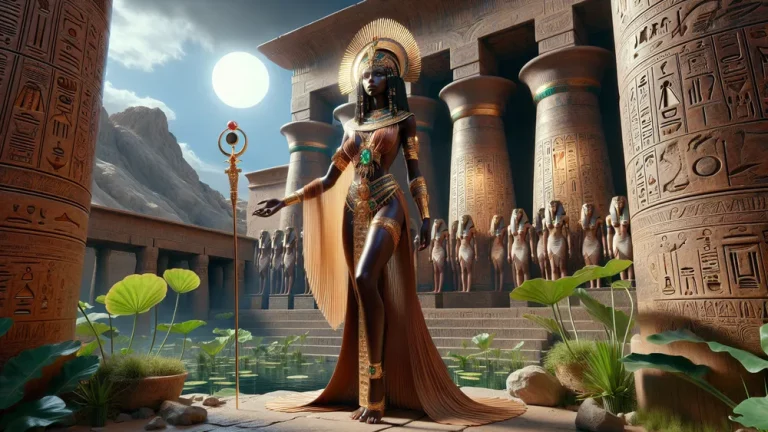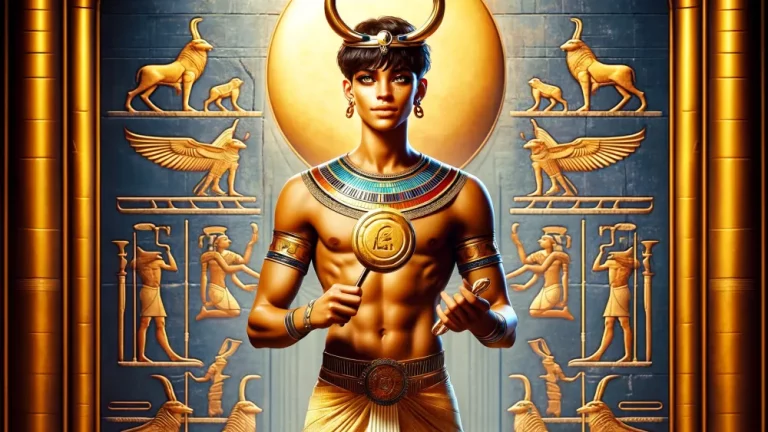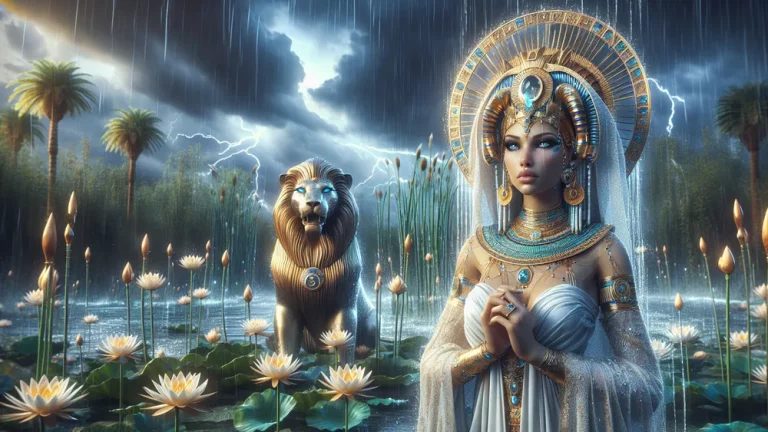Aiolos: Greek Mythology’s God And Keeper Of The Winds
Welcome to our look into Aiolos, an interesting figure from Greek mythology who is known as the Keeper of the Winds. Think of a world where natural forces have personalities and powers all their own. In that mythological place, Aiolos stands out as a vital character who directs the winds, similar to a conductor managing a concert of natural elements.
Key Points:
- Aiolos is the Greek god of winds.
- He is often called the Keeper of the Winds.
- Aiolos lives on the mythical island of Aiolia.
- He can control the Anemói, the four wind gods.
- Aiolos helps heroes like Odysseus and Jason.
- His family includes notable figures like Sisyphus and Athamas.
- Aiolos represents the power and unpredictability of nature.
When we look into his story, you will see how Aiolos’ unique powers and responsibilities are described in old texts and how his influence appears in different mythological stories.
Whether you are new to Greek mythology or you are trying to deepen your understanding, this post will walk you through the life, abilities, and cultural significance of Aiolos, giving an all-around look at this interesting deity.
Aiolos : Overview and Key Facts
| Key Fact | Description |
|---|---|
| Name | Aiolos (also spelled Aeolus) |
| Role | Keeper of the Winds |
| Parents | People often think he is the son of Hippotes, but some say he is the son of Poseidon or Hellen |
| Place to Live | The mythical island of Aiolia (Aeolia) |
| Importance | He controls the winds, helping or hurting sailors and heroes in Greek mythology |
| Seen in Texts | Seen a lot in Homer’s ‘Odyssey’ and other old Greek stories |
| Children | Some of his kids are known as Sisyphus, Athamas, Cretheus, Salmoneus, and Perimede |
| Represents | He stands for the natural forces of wind and weather, often seen like a go-between for gods and mortals |
| Influence on Culture | Highly regarded in old Greek culture, talked about in today’s books, art, and popular things |
Who is Aiolos?
To really get the importance of Aiolos in Greek mythology, we first need to look into who he is and the tasks he had in different stories.
What Does Aiolos Do in Greek Myths?
Aiolos has the important role of being the Keeper of the Winds in Greek mythology, a job that puts him in charge of one of nature’s most powerful and unpredictable forces. Think of Aiolos like a conductor who arranges how the winds blow to help or challenge people crossing the seas.
His main job is to manage the Anemói, the four directional winds, making sure they blow in ways that either help or hinder according to what the gods want or his own choice. This power over the winds made Aiolos really important for sailors and travelers who depended on him for safe and quick trips.
Important because he could influence what happened in different stories, he became a key player in the tales of heroes and gods. In old writings, they see Aiolos with respect and power. In Homer’s ‘Odyssey’, they show him as a welcoming and strong person who gives Odysseus a bag with all the winds in it, a gift to make sure his trip home is safe.
This means Aiolos could manage the wind and affect mortal fates. Similarly, in other stories, Aiolos appears as a go-between for gods and mortals, using his power to either help or halt those who ask for his help. These ancient writings stress Aiolos’ key role in Greek mythology, showing his power over nature and human outcomes.

Aiolos, the Keeper of the Winds in Greek mythology, controls the winds to either assist or challenge sailors and heroes, making him a crucial figure in their journeys and stories.
Aiolos’ Family Tree
Aiolos’ family is interesting in myths, and you see different versions in various stories. Often, he is thought of as the son of Hippotes, a descendant of the god Poseidon, which places him in a godly family. In other stories, Aiolos appears as the son of Hellen, named after the Greeks, which shows his important background. His family tree includes his children, who also matter in myths. His kids are:
- Sisyphus: Famous for his endless punishment of pushing a stone up a hill, only for it to roll back down.
- Athamas: A king who went through many tragic things, including madness caused by Hera.
- Cretheus: Started the city of Iolcus and is the father of Aeson and grandfather of Jason of the Argonauts.
- Salmoneus: A king punished by Zeus for trying to copy thunder and lightning.
- Perimede: Not very famous, sometimes said to be the mother of Hippodamas and Orestes by the river god Achelous.
These connections show how Aiolos fits into the bigger picture of Greek mythology, linking him to many important myth stories.

The Island Where Aiolos Lived
The island of Aiolia, where Aiolos lived, is often described as a floating, beautiful place with a bronze wall and smooth cliffs, making it a remote and strong fortress. Think of Aiolia as a distant command post, where Aiolos could control the winds with accuracy, much like a weather station monitors and influences weather patterns. The island, which is described in Homer’s ‘Odyssey’ as beautiful and peaceful, is where Aiolos lived with his family.
Its importance is in its location and the power it gave Aiolos over the winds; it was key for sailors and travelers looking for good conditions. In old writings, Aiolia appears as a divine realm, showing Aiolos’ authority and the respect he had as the Keeper of the Winds.
Aiolos’ Powers and Abilities
Since we have looked at Aiolos’ identity and his mythical home, we should look into the amazing powers and abilities that are part of his role in Greek mythology.
How Aiolos Controls the Winds
One of the most important things about Aiolos in Greek myths is that he can control the winds. You can think of him as someone who manages the winds to either create calm or chaos, depending on what’s needed. He could call and hold back the Anemói, the four directional winds, each having its own traits.
This power means he could change weather and sea conditions, which made him important to sailors and travelers. For example, Aiolos could let out the gentle Zephyrus, the west wind, to make conditions calm and nice, or he could release the fierce Boreas, the north wind, to make storms and chaos.

This ability to control the winds made Aiolos either a helpful friend or a tough enemy, based on the situation and what he decided to do for those who asked for his help. In many stories, Aiolos’ wind-controlling powers were very important. A well-known example is when, in Homer’s ‘Odyssey,’ Aiolos helps Odysseus by giving him a bag holding all the winds, except the west wind, to make sure Odysseus gets home safely.
Sadly, Odysseus’ curious crew opens the bag, letting the winds out and blowing their ship off course. Another famous story is about the Argonauts, where Aiolos helps Jason and his crew by calming the seas and providing good winds for their trip. These stories show how Aiolos could change natural events and affect what happened through his control of the winds.
The Four Wind Gods
To understand Aiolos’ role as the Keeper of the Winds, you need to know the four wind gods, or Anemói. These gods stand for the main directions and the winds that come from them, each having unique features and effects. You can think of them as the four main directions, each controlling different weather patterns and conditions.
As their master, Aiolos had the power to call or hold back these winds, which made him very important in Greek stories. Among the Anemói are Boreas, the north wind; Zephyrus, the west wind; Notus, the south wind; and Eurus, the east wind.
Each of these wind gods had their own traits and played special roles in different stories, showing the jumprse and sometimes surprising nature of the weather.
Here’s a clearer look at each wind god, their direction, and their features:
| Anemós | Direction | Features |
|---|---|---|
| Boreas | North | Cold and harsh, often tied with winter storms and bringing chill winds. |
| Zephyrus | West | Gentle and mild, known for bringing spring and early summer breezes. |
| Notus | South | Hot and moist, usually related to late summer and autumn rains and storms. |
| Eurus | East | Unpredictable and variable, often causing sudden changes in weather. |
These wind gods not only show the different weather patterns in Greek stories but also highlight Aiolos’ great power in managing and directing these main forces of nature.
Aiolos, as the Keeper of the Winds, controls the four wind gods—Boreas, Zephyrus, Notus, and Eurus—each representing different directions and unique weather traits, showcasing his significant power in Greek tales.
Aiolos in Famous Stories
Since we have looked at Aiolos’ powers and his connection to the wind gods, now let’s look into some well-known tales where Aiolos’ influence stands out.
Aiolos and Odysseus’ Adventure
In Homer’s tale, Aiolos has a key role in Odysseus’ trip home after the Trojan War. After going through many challenges, Odysseus and his crew come to the floating island of Aiolia, where Aiolos, the Keeper of the Winds, lives. Aiolos, seeing Odysseus’ troubles, chooses to help him by giving him a special gift – a bag with all the winds except for the gentle west wind, Zephyrus.

Much like a modern-day direction tool, this bag was made to guide Odysseus safely to Ithaca by making sure that only good winds push his ship. Aiolos’ gift means he controls the winds and wants to help those he finds deserving. Because of how important Aiolos’ gift was, it cannot be overstated.
By holding the wild and dangerous winds in the bag, Aiolos gives Odysseus a clear path home. This act of kindness shows Aiolos’ power and willingness to help, as he could have easily not given aid. For a while, the plan works well, and Odysseus’ ship moves smoothly towards Ithaca.
However, things go wrong when Odysseus’ crew, out of curiosity and greed, open the bag while Odysseus sleeps, thinking it has treasure. The results of this action are immediate and bad. When they open the bag, the winds come out with full force, making a big storm that blows the ship off course, undoing all their progress.
This moment highlights the need for trust and discipline in Odysseus’ crew and serves as a clear reminder of the unpredictable winds that Aiolos controls. The crew’s lack of understanding and hasty actions lead to a big setback, making their journey longer and adding more hardships.
Aiolos and the Quest of the Argonauts
In the story about the Argonauts, Aiolos has a key part in helping Jason and his crew as they try to find the Golden Fleece. The Argonauts, a group of heroes led by Jason, start a dangerous trip across the seas, facing many challenges and problems.
Seeing how important their trip was, Aiolos chose to help them by giving good winds to make sure they traveled safely. Think of Aiolos as a kind weather predictor, providing the Argonauts with the best conditions for their journey. His power over the winds lets him steer their ship, the Argo, through tricky waters to avoid any dangers.
Aiolos’ help is especially important when key moments happen on the Argonauts’ trip. For example, when the Argo gets close to the Clashing Rocks, a deadly pair of rocks that smash together without warning, Aiolos’ good winds push the ship quickly through the narrow passage before the rocks can close. This divine help means Aiolos is powerful and willing to back heroic efforts.
By making sure the winds were on their side, Aiolos not only helped the Argonauts’ journey but also showed the key role that gods and divine beings had in helping mortal quests succeed.
Symbolism and Cultural Impact
After we looked at Aiolos’ part in these old stories, now let’s look at the bigger meaning and importance he had in ancient Greek society.
What Aiolos Symbolized in Ancient Greece
In ancient Greek society, Aiolos meant the strong and random nature of the winds. The Greeks knew that the winds could be both helpful and harmful, just like the natural forces we see today. For instance, a gentle breeze could help in sailing and farming, while a bad storm could cause damage. Aiolos, being the Keeper of the Winds, stood for this two-sided nature.
He was seen as a person who could control and guide these forces, so he was important in a society that needed sailing and farming. The winds, under Aiolos’ control, were often seen as divine signs or messages, affecting people’s lives and the world around them. Aiolos was also shown in different kinds of art and writing, reflecting his importance in Greek myths.
In old texts, he is often described as a grand figure, living on the floating island of Aiolia, with his kids, the Anemói (wind gods). Pictures of Aiolos can be found on pottery, wall paintings, and statues, where he is usually seen holding a bag or jar, meaning his control over the winds.
Temples and altars for Aiolos were rare, but he was important in the practices and prayers of sailors and farmers who wanted his help for safe journeys and good harvests. Through these images, Aiolos’ role as a go-between for the natural world and human activities was clear in the minds of the Greeks.
Aiolos in Today’s World
Aiolos is still an interesting character in today’s books, art, and culture. Often, he is mentioned in works about nature’s power and how people interact with it. For instance, in today’s literature, Aiolos might seem like a sign for the random forces that shape our lives, much like how weather can quickly change.

In art, Aiolos can be seen in ways that show his power over the winds, like in pictures or statues that see him with a bag or jar. In popular culture, you might find Aiolos in characters or stories that use ideas from his myth, such as in fantasy books or films where someone can control the wind.
These modern mentions keep the memory of Aiolos alive, reminding us how ancient myths still affect how we understand the world.
Greek Mythological Heroes and Figures
Greek mythology has a wide group of heroes and figures, each with their own special stories and features. Hercules was strong, and Odysseus was clever. These characters have thrilled people for a long time. If you want to explore the full list of all the Greek Mythological Heroes and Figures, you’ll find a complete collection that looks into their interesting stories and legendary actions.
This long list gives a better understanding of the many characters found in Greek myths, which offers insights into their roles, adventures, and the importance they had in ancient Greece.
FAQs
1. Who were the parents of Aiolos?
The parents of Aiolos were Hippotes and the nymph Menippe.
2. What is the significance of Aiolos’ island, Aiolia?
The significance of Aiolos’ island, Aiolia, lies in its role as the mythical home and domain of Aiolos, where he controlled the winds and interacted with various heroes in Greek mythology.
3. How did Aiolos help Odysseus in the Odyssey?
Aiolos helped Odysseus in the “Odyssey” by giving him a bag containing all the winds except the west wind to ensure a safe journey home.
4. Are there any temples dedicated to Aiolos?
Temples dedicated to Aiolos are not prominently recorded in ancient Greek history.







